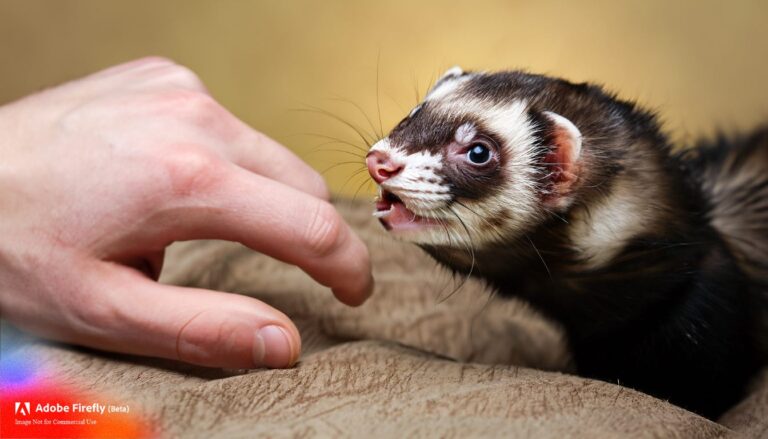
Are you worried about sudden hair loss accompanied by weight loss in your pet ferret? If yes, then you are not alone. Many people have frequently complained about why my ferret is skinny and losing hair. In this article, we will discuss seven reasons why my ferret is skinny and losing hair, along with the symptoms & treatment. If you are keen on understanding the unsightly loss of hair accompanied by weight loss, go through this article deeply. First, Let’s learn the possible causes of ferrets being skinny and losing hair and how they affect your pet.
My Ferret Is Skinny and Losing Hair: 7 Causes, Diagnosis & Treatment
Hyperadrenocorticism
The first and foremost reason behind your ferret’s sudden weight loss & hair loss could be Hyperadrenocorticism, also referred to as adrenocortical or adrenal gland disease. According to the MSD veterinary manual, adrenal gland disease is one of the most common endocrine tumors often seen in Middle-aged ferrets. Based on the previous study by researchers & scientists, this disease is often considered to be the increased concentration of gonadotropins after neutering or spaying a ferret.
Studies have noticed a loss of negative feedback, persistently stimulating the ferret adrenal cortex, which may further lead to adrenocortical growth. According to ScienceDirect, adrenal gland disease in ferrets is often caused by an adrenocortical adenoma (16%), hyperplasia (56%), and adenocarcinoma (26%), which further cause a release of excess sex hormone, especially estradiol. Son of the most common symptoms of adrenocortical disease tends to be as follows:
- Fatigue
- Muscle Weakness
- Weight Loss
- Hair Loss
- Changes In Skin Pigmentation
- Nausea And Vomiting
- Abdominal Pain
If you want to dig deeper into the treatments available for this kind of disease, it depends upon specific conditions. However, some of the most common treatments:
- Injectable Hormone Therapy
- Surgery
- Medications For Any Underlying Cause Of This Condition
If you want to understand more in-depth about this disease’s diagnosis, treatment, and other symptoms, consider reading my article on female ferrets losing hair on tails due to adrenal gland disease.
Bacterial Disease
Another reason your ferret is losing hair on its body and looking very skinny could be due to bacterial diseases. Bacterial infections are also among the most common causes of different health problems in ferrets. Therefore, if you are witnessing sudden hair loss, weight loss, and skin problems, your ferret is likely to be a sufferer of bacterial disease. According to the Bishops Stortford Vets, some of the most common & frequently seen bacterial infections in ferrets are as follows.
- Bacterial pneumonia
- proliferative colitis
- Helicobacter gastritis
The most common bacteria that often causes skin infection, pneumonia, respiratory infection, kennel cough, and other infection are said to be:
- Streptococcus Canis
- Pasteurella Multocida
- Bordetella bronchiseptica
Chronic Colitis
If you have noticed your ferret suffering from diarrhea from time to time, accompanied by hair loss & weight loss, they might have chronic Colitis. However, you should note that the exact cause of chronic Colitis is still unknown, but science claims that a combination of factors like genetics, death, & infection could be the culprit.
In addition, this type of inflammatory disease condition is said to be very common in ferrets. According to the VCA Hospital, This condition exhibits classic symptoms like chronic diarrhea, accompanied with or without mucus or blood. Talking about other symptoms, the National Institute of Health states the following:
- Rectal prolapse
- Lethargy
- Fever
- Palpably thick colon
- Mucus or blood in stool
If your ferret suffers from this disease, you will likely recommend oral chloramphenicol treatment for 10-21 days.
Lyme Disease
According to Vets4Pets, Lyme disease is one of the most common tick-borne diseases that can also affect us (humans). However, you should note that our beloved ferret friend cannot catch this disease directly but often gets manifested by tick bites. As per Patton Veterinary Hospital, Lyme disease is often caused by bacteria or Spirochete, known as Borrelia Burgdorferi, which is often picked by ticks.
This disease usually harbors a tick when it bites any infected animal to ingest its blood, then passes it to another animal, especially pets around us, when it bites again. You should know that the borrelia bacteria is quite popularly spread by deer ticks, which are said to be the size of a sesame seed when engorged. You can easily miss this bacteria or fur if your ferret has thick fur. However, a simple blood test can help you understand whether your ferret is affected by Lyme or other tick-borne illnesses.
Valley Fever
Yes, you heard it right. Your ferret might suffer from valley fever, causing sudden hair loss and weight loss. You should note that valley fever is a fungal infection common in the Southwestern United States. Not only will you notice your ferret losing weight & hair, but also lots of coughing accompanied by difficulties in breathing.
If you find your ferret with a fever, cough, & shortness of breath, I will highly advise you to get your pet checked & diagnosed at the nearest vet’s clinic. A National institute of Health found that this fever progresses quickly in ferrets. If you leave the valley fever untreated, your ferret is likely to develop other certain conditions like:
- Hyperpyrexia
- Lymphopenia
- Hypotalbumania
Talking about the treatment & diagnosis of valley fever in ferrets, you should first consult your veterinarian. The veterinarian will be the best person to diagnose and treat this condition. While researching, I learned about an informative article posted in Little Critters Veterinary Hospital. According to them, your veterinarian will likely recommend Fluconazole meditations, which are said to cross into the central nervous system and have been associated as the only drug to treat Central Valley fever infection.
Scabies
Maybe your ferret is suffering from scabies, forcing your pet to lose hair and weight. Even though many claim that scabies is an uncommon parasitic skin disease found in your ferret body, it can manifest in your pet. If your ferret is losing weight or looking skinny, itching its body accompanied by skin irritation, this is scabies.
There are usually two forms when it comes to understanding the scabies that impact ferrets. The first form of scabies (Mange) can be found around your ferret’s feet, toes, and pad area. It is quite noticeable, and your ferret will constantly scratch the affected area.
If you are not affected, you are being swelled, red, and raised as we are, and with us, your ferret suffers from a second type of scabies. To diagnose what type of scabies is causing your pet to lose hair, vets will diagnose blood & urine analysis. Vets can also identify this parasitic mite by checking the skin scraping from your pet under a microscope. Some of the most common symptoms that you are likely to notice in your ferret when it is suffering from scabies include:
- Itching
- Hair Loss
- Rashes
- Severe Inflammation
- Skin & Nail Sloughing
According to the PetMD, this type of scabies is usually caused by the parasitic mite, ‘Sarcoptes Scabiei.’ Talking about treatment, Wikivet suggests that your veterinarian will likely recommend multiple Ivermectin injections to resolve this infection.
Dermatophytosis
Lastly, another reason your ferret is losing its hair and weight could be due to a fungal infection called Dermatophytosis. Dermatophytosis is also referred to as tinea or ringworm in ferrets. According to the Merck Veterinary Manual, these ringworm lesions are often found on the back of ferrets and are likely caused by Microsporum Canis. If your ferret is suffering from this condition, you are likely to see other symptoms, which include:
- Alopecia
- Broken Hairs
- Erythema
- Scaling
- Crusting
If your ferret suffers from this condition, I highly recommend diagnosing it at the nearest veterinarian clinic. Your veterinarian may recommend the following:
- Microscopic Examination
- Trichogram
- Fungal Culture.
Some of the most common treatments that we have noticed, resulting in a good prognosis, are as follows:
- Micro Conazole
- Miconazole
- Terbinafine
- Clotrimazole
- Enilconazole
According to Vetlexicon, your veterinarian may also recommend oral griseofulvin in severe cases of Dermatophytosis.
Conclusion
I hope you have all you need to know about why my ferret is skinny and losing hair. No matter what the culprit behind this condition is, you should pay attention to visiting the nearest veterinary clinic with your pet. The veterinarian is the best person to diagnose & treat this condition effectively and make suggestions to help you prevent this kind of condition in the future.
I have given all the information after doing hours & hours of research. If you find this article helpful, then please share it. This will appreciate my hard work. Your share will help many people learn why their ferret is skinny and losing hair. In addition to this, if you have any other concerns regarding this topic or question, make sure to comment below. I would like to know what
I have missed this article and will include it in the future. If you want to stay updated with the care & responsibility required for ferrets as pets, check my other helpful articles & guides shared on this website. Check my other helpful post on ferret problems & solutions to learn what you’d like to encounter as your pet ages. See you in the next post, till then, take care & goodbye.






